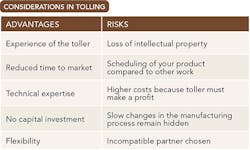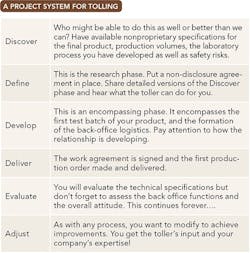Multiple conditions may arise when considering toll manufacturing is logical and prudent. For instance, a chemical company may lack the specific equipment, spare capacity or even expertise to make a product or may want to get a product to market faster than it could on its own. In such cases, having another firm handle production or other necessary tasks can make good sense.
Tolling differs considerably from simply buying another company’s offering. When you purchase a product branded and sold by another manufacturer, that company sets the product specifications and price — and these can change at any time if the amount you buy isn’t large enough to give you sufficient clout. In contrast, in a tolling contract, you set the specifications and process requirements, agree ahead of time to a pricing structure, and get the product exclusively. You also decide how much authority the toller has to make adjustments (think of this as allowing the toller to offer its expertise to improve your product). Yes, a toll deal involves more work upfront but you get what you need in the way you want it and only you have access to that product!
When To Consider Tolling
The case for using tolling services is the most obvious for a young company that doesn’t have any chemical processing equipment to speak of and likely lacks the experience and expertise to run an efficient and safe chemical operation. The toller’s knowhow can smooth out the bumpy beginnings to many chemical products.
The right toller has the equipment, experience, infrastructure and resources in the area you need. In addition, the toller will free you from responsibilities such as:
• handling chemicals safely;
• training staff;
• providing a chemical laboratory;
• producing pilot-scale batches;
• dealing with waste management; and
• adhering to chemical regulations.
Moreover, opting for a toller avoids the need to invest company capital in a product before its commercial acceptance is established, and can speed the product to market. Remember, in the future, you can buy your own equipment and have gained some experience of your chemical processes in a production environment.
Tolling also can offer advantages to an established chemical company. It provides a way to avoid capital investment or to respond to spikes in demand. In addition, I’ve heard that some firms like the idea of tolling because it looks more like a raw material in the accounting ledgers while operations sees it as an income source.
For a new product’s pilot or launch, sometimes a chemicals maker’s own equipment isn’t suitable because it’s designed to produce large volumes of product. So, using a toller with smaller equipment makes more sense during these early phases.
A contract manufacturer also can play a role in a business continuity plan by providing a second facility to make your critical product.
Table 1. Using a contract manufacturer comes with both pros and cons.
Table 1 summarizes the pros and cons of using a toll manufacturer.
Finding Potential Tollers
Locating contract manufacturers with the technical expertise you need can be difficult; this is where an experienced chemical engineer or sourcing person is invaluable. Speedy success depends upon knowing how to search the Internet with key words for your product. A preliminary search should lead you to some tollers’ websites. Then, talking to them on the phone — without revealing any details of your product — might give you insight into other key words to refine your Internet search. Now you can implement a project structure such as: Discover, Define, Develop, Deliver, Evaluate, Adjust (Table 2).
Once you have a candidate company or two, make contact with someone at the toll facility and do an initial evaluation for fit. It’s often desirable early on to understand the business model of the toller (tolling versus manufacturing for its own sales, distribution, equipment sales, etc.), general business philosophy, quality management program, safety program, project management method, ownership, etc. Keep in mind the toller will be doing the same for your company!
Information sharing. You will need to give the candidate toller some information about what you want done. So, ahead of any of these discussions, carefully consider what information you’re willing to divulge before a non-disclosure agreement is in place.
Plan on sharing the following information (without any proprietary details):
• a description of your company’s business, markets, and why you’re considering tolling;
• an overview of the product to be made and expected yearly volume for three years;
• any safety risks of which you are aware;
• raw materials that require special storage conditions or handling;
• unit operations needed based on your product development work — the toller eventually may suggest a different path; and
• packaging requirements when leaving the toller’s facility.
Photographs are worth a lot. Just ensure you don’t show too much information at this point in the process.
Relationship structure. This might be a good time to consider how you will work with the tolling company. I prefer to view tolling agreements as partnerships as compared to dictatorships; in my experience, a partnership mindset provides better results. You want a match that allows the toller to make a reasonable profit while you get your product at a cost you can afford. A partnership should go both ways; so, get a sense if the toller shares that mindset. This does not mean the toller will “invest” in your company by taking a loss early on to reap benefits later. In fact, that’s not a constructive approach for a steady relationship.
For a young company, your product quality probably will be higher from the get-go; you can work together on improvements to the product, desirable derivatives or even completely new chemical products for the market.
Disclosure of proprietary information. As discussions progress, sharing your proprietary needs will become necessary; so, you will want a non-disclosure agreement (NDA). Tollers are very familiar with these documents. Therefore, if you sense surprise at your request for a NDA, take that as a warning sign. You likely will end up with a mutual NDA because the toller will want to protect its proprietary information, too. A toller seeking a mutual NDA is being appropriately cautious; this also could signal that it expects to share sensitive information with you.
Table 2. Success demands paying appropriate attention as the project progresses.
After the NDA is in place, you’ll need to share in some detail what you want to do. That very well may include the chemistry, the process you’ve developed in the lab and, eventually, the quality specifications and test methods. In return, the toller will share some of its expertise and advise whether its equipment is suitable. Drawings and more detailed photographs can really speed up the information transfer. Don’t consider it a failure if you sign a NDA and find out the toller can’t accomplish the task. You may have gained some valuable information anyway; so, treat the episode not as a failure but as part of your research! The NDA protects your product information.
Digging deeper. If the initial technical discussions indicate a potentially good match, it’s time to get more details about the toller. Don’t simply send a generic manufacturing checklist or topics list. Instead, go through the topics and questions to determine what’s important to your company. You’ll drive yourself crazy trying to get data about all possible topics, so prioritize! The toller will appreciate getting one page covering really important stuff the first time you ask for information rather than having to answer four pages of questions about all sorts of things. You’ll ask more questions as you finish each phase; knowing it has moved into the next phase will add to the toller’s motivation to answer your next set of questions with care and detail. Take advantage of any opportunities to visit the toller’s facility during these discussions. Face-to-face conversations usually add a great deal of value.
For any potential toller, make sure to investigate a number of topics:
• Does it perform the operations your product requires?
• What expertise and success does it have with similar chemistry or unit operations?
• What are its quality control and quality management programs?
• How much flexibility does it have for new projects? How is the toller’s management treating your company’s proposal?
• What method of new product management does it have to bring your product into its facility?
• What is its corporate culture like?
• How thorough is its regulatory understanding and how good is its compliance?
• What access will you have to its facilities and process data about your products? (You should get the data you want because it’s your product!)
• Do you get along with and trust the people — e.g., the project manager, technical people, manufacturing floor operators and supervisors?
• How good is the technology it uses? (After all, equipment and expertise are reasons you are tolling.)
• What vertical services, such as buying raw materials, quality assurance of raw materials, drop shipping, etc., does it offer?
• How financially stable is the firm?
Essential Follow-Up
There’s no cut-and-dried method for evaluating technical capability and back-office logistics. The possible partnership easily could fall part in this development phase. Here again, it helps to have a plan with priorities. Your company might be most comfortable with the toller showing laboratory proficiency; you may need pilot batches made for your customers (which gives you an opportunity to evaluate interactions with the toller), or maybe you’re ready for the first production batch. You will need to pay a fee for service at this point; it could substantially exceed the cost set in the eventual production agreement. You are in product development and development usually costs more per unit than production for reasons of size and increased risk. Consider any purchase orders at this phase as development expenses. Use this phase to confirm your comfort with the toller’s technical ability, willingness to work with you, back-office logistics, shipping, etc. Again, pay attention to how it responds to things that don’t go well, as this likely will track over to production.
I encourage you to visit the toller’s facility no later than this development phase. Having your technical people on site for some portion of these initial batches is a good idea. Your people can bring insight to the toller’s folks, explain quality testing, share anecdotal product/process observations and build a rapport. If you have a supplier audit team, members might attend to evaluate all the other aspects of doing business with this company.
The financial stability of your tolling partner is a serious matter. You are giving up direct control of the manufacturing of a promising product for your business — and, thus, exposing your company to risk if the toller stops making the product. So, you need to check public records on the financial health of the organization. Ask some reasonable questions about cash flow, accounts payable timeline, distribution of its income among different business segments or different customers. While at the facility, look for equipment that appears in disrepair, inventory not neat and orderly, and view posted safety and management notices to employees. You want to feel comfortable that the toller is not near bankruptcy and pays its bills on time. It, too, probably wants to know something about your company’s stability. These are all reasonable requests when you want a functioning partnership.
Proceeding To Production
To move from development to manufacturing requires a detailed agreement of work. This will legally define responsibilities, e.g., how the manufacturing process and quality information is transferred, and the details of how communications will go between the two companies. The agreement must cover technical aspects and the back-office procedures. This is a supplier agreement with the added complexity of manufacturing to specifications. I suggest starting with your chemical supplier agreement and then blending it with aspects of your company’s contract for services. If this arrangement is new to your company, consider asking the toller for a generic agreement that it uses and then build yours from that template.
By work agreement time, you should be very familiar with the toller’s project and product management approaches. The work agreement should spell out critical-to-you components from the programs, including:
• communication methods;
• what the toller may adjust on its own;
• when your company can come into the facility;
• contact people at both companies specific to topics;
• practical methods of protecting your information;
• process-control-data tracking and availability; and
• whether the toller may subcontract any portion of your product.
Then, set up scheduled pre-production and post-production information transfer. Have your chemist or chemical engineer at the toller’s facility for first production — it’s a good investment. Test the back-office flow.
Plan on making adjustments to process and procedures with the toller; this is expected. Pay attention to how the toller responds to your requests and needs. Never lose track of the importance of the toller remaining a willing and able partner.
Your initial test of the relationship could be the first time a batch is close to out of specification, misses the spec, or something happens that delays a shipment. Stay calm, listen to what the toller (partner) is saying and then try to work out the best solution to limit damage to both companies. Always remember that your own manufacturing isn’t perfect. Expect some difficulties to occur and be prepared to work through them. At least with a tolling company you have additional resources and talent to assist in finding a satisfactory solution.
Use A Toller Without A Toll
Opting for contract manufacturing often makes business sense. A toller’s skilled, experienced production team can speed your time to market while reducing your risk of failure as a company new to chemical manufacturing. Moreover, the tolling option might offer lower manufacturing costs via efficient labor usage, experienced maintenance of equipment, economies of scale, and spreading of capital investment. You also get input from the toller — another set of eyes viewing your process and offering possible improvements in manufacturing and quality testing.
However, you must take steps to ensure you get what you need and leave nothing to chance. Don’t assume the other party has all the bases covered; ask questions and get answers you understand. Build a strong, mutually beneficial work agreement that allows for changes as the relationship develops and stay in communication. Once you’ve selected your partner, give that firm the chance to show you what it can do. Provide the toller with the inputs and feedback it needs to excel. Mutual respect will lead to success of a well-crafted partnership with a qualified toll manufacturer.
DAVID MORSE is principal of DRM Chemical Process Services, Keene, N.H. Email him at [email protected].


